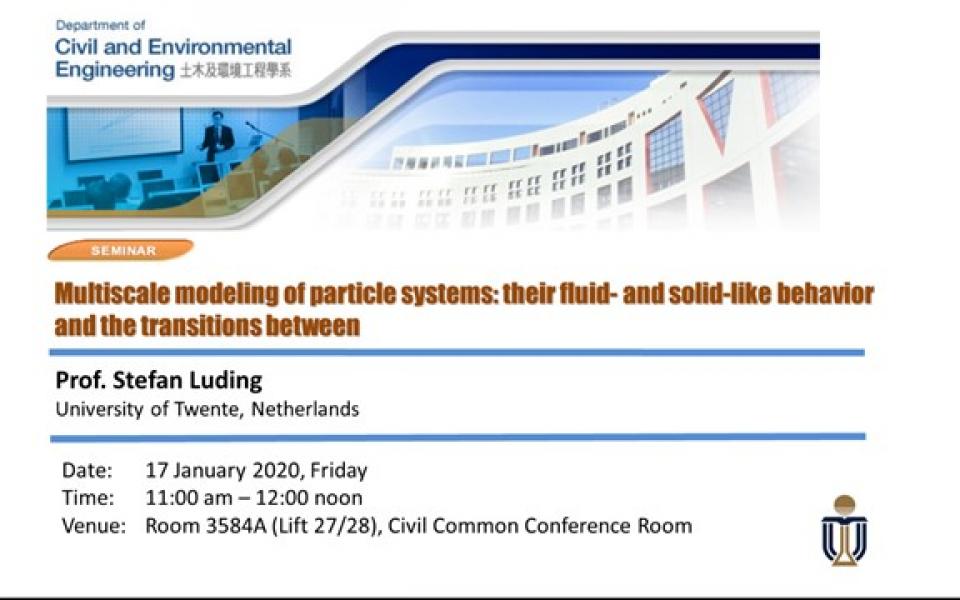Supporting the below United Nations Sustainable Development Goals:支持以下聯合國可持續發展目標:支持以下联合国可持续发展目标:
|
Multiscale modeling of particle systems: their fluid- and solid-like behavior and the transitions between |
| by |
| Prof. Stefan Luding University of Twente, Netherlands |
|
Abstract |
|
The behavior of particles such as powders and granular matter is of considerable interest in a wide range of industries and nature. These materials are intrinsically dissipative and disordered; often they come with a wide distribution of particle sizes and materials or mixtures, and can behave both solid- or fluid-like. The related mechanisms and processes in particle systems are active at multiple scales (from nanometers to meters) and understanding them is an essential challenge for both science and application, as well as the theoretical description of all the transitions between the different states. In order to understand the fundamental micro-mechanics one can use particle simulation methods [1-6]. However, large-scale flow applications (due to their enormous particle numbers) have to be addressed by coarse-grained models [1,3,6] or by rheology and continuum theory [1,5,6]. In order to bridge the gap between the scales, so-called micro-macro transition methods are necessary, which translate particle positions, velocities and forces [2,3,4] into density-, stress-, and strain-fields, which all must be compatible with the conservation equations for mass, momentum and energy of continuum mechanics. [1] A. Singh, K. Saitoh, V. Magnanimo, and S. Luding, Role of gravity or confining pressure and contact stiffness in granular rheology, New J. Phys. 17, 043028, 2015 [2] A. Singh, V. Magnanimo, K. Saitoh, and S. Luding, Effect of cohesion on shear banding in quasi-static granular material, Phys. Rev. E 90(2), 022202, 2014 [3] N. Kumar, S. Luding, and V. Magnanimo, Macroscopic model with anisotropy based on micro-macro informations, Acta Mechanica 225(8), 2319-2343, 2014 [4] N. Kumar and S. Luding, Memory of jamming -- multiscale models for soft and granular matter, Granular Matter 18, 58, 2016 [5] D. Vescovi and S. Luding, Merging fluid and solid granular behavior, Soft Matter 12, 8616-8628, 2016 [6] S. Roy, S. Luding, and T. Weinhart, A general(ized) local rheology for wet granular materials, New J. Phys. 19, 043014, 2017 |
|
Biography |
|
Stefan Luding studied physics at Bayreuth, Germany (reactions on complex and fractal geometries). He did his PhD on the simulations of dry granular materials in the group of Prof. A. Blumen in Freiburg, Germany and spent his post-doctorate time in Paris IV, Jussieu, with E. Clement and J. Duran, before he joined the Computational Physics group in Stuttgart, Germny, with Prof. Herrmann in 1995, where he achieved his habilitation in 1998. In 2001, he moved to DelftChemTech at the TU Delft, Netherlands, as Assoc. Prof. Particle Technology. Since 2007 he chairs the group Multiscale Mechanics (MSM) at the Faculty of Engineering Technology and MESA+ at the University of Twente, Netherlands. His major research expertise is on granular matter, non-Newtonian flow rheology, non-linear solids, particle interactions, cohesive powders, asphalt, composites, bio-/micro-fluid systems, self-healing materials and most of all on micro-macro transition methods. Among many other tasks and services for the community, he is since 1998 Editor in Chief of the journal Granular Matter as well as, since 2005, president of AEMMG organizing the Powders and Grains conference series with the next event taking place in Buenos Aires, Argentina, July, 2021. |
|
For enquiries, please contact Ms Rebecca Yau at Tel: 2358 7164. |
